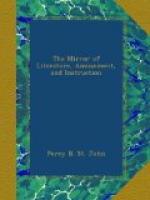A French writer, in 506, says, “this abuse was introduced by the superstition of the people, and afterwards gained ground by the ignorance of the bishops.” This appears evident from Pithon’s Collection of Canons, containing some forms under the title of The Lot of the Apostles. These were found at the end of the Canons of the Apostles in the Abbey of Marmousier. Afterwards, various canons were made in the different councils and synods against this superstition; these continued to be framed in the councils of London under Archbishop Lanfranc in 1075, and Corboyl in 1126.
The founder of the Francisians, it seems, having denied himself the possession of any thing but coats and a cord, and still having doubts whether he might not possess books, first prayed, and then casually opened upon Mark, chapter iv, “Unto you it is given to know the mystery of the kingdom of God; but unto them that are without, all these things are done in parables;” from which he drew the conclusion, that books were not necessary for him.
One Peter of Thoulouse being accused of heresy, and having denied it upon oath, one of those who stood by, in order to judge of the truth of his oath, seized the book upon which he had sworn, and opening it hastily, met with the words of the devil to our Saviour, “What have we to do with thee, thou Jesus of Nazareth?” and from thence concluded that the accused was guilty, and had nothing to do with Christ!
The extraordinary case also of King Charles I. and Lord Falkland, as applicable to divination of this kind, is related. Being together at Oxford, they went one day to see the public library, and were shown, among other books, a Virgil, finely printed and exquisitely bound. Lord Falkland, to divert the king, proposed that he should make a trial of his fortune by the Sortes Virgilanae. The king opening the book, the passage he happened to light upon was part of Dido’s imprecation against Aeneas in lib. iv. l. 615. King Charles seeming concerned at the accident, Lord Falkland would likewise try his own fortune, hoping he might fall upon some passage that could have no relation to his case, and thus divert the king’s thoughts from any impression the other might have upon him; but the place Lord Falkland stumbled upon was still more suited to his destiny, being the expressions of Evander upon the untimely death of his son Pallas, lib. xi. Lord Falkland fell in the battle of Newbury, in 1644, and Charles was beheaded in 1649.
The kind of divination among the Jews, termed by them Bath Kol, or the daughter of the voice, was not very dissimilar to the Sortes Sanctorum of the Christians. The mode of practising it was by appealing to the first words accidentally heard from any one speaking or reading. The following is an instance from the Talmud:—Rabbi Jochanau and Rabbi Simeon. Ben Lachish, desiring to see the face of R. Samuel, a Babylonish doctor: “Let us follow,”




